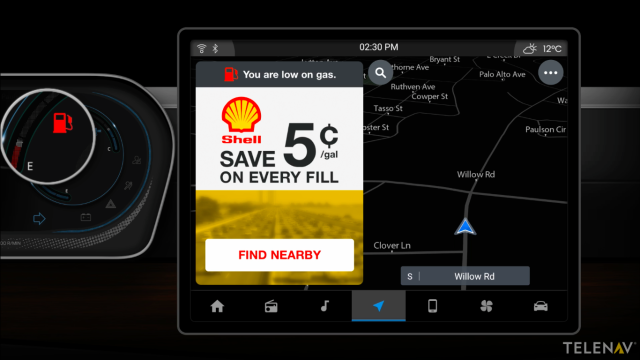Spend enough time googling “tacos” or “pasta” and eventually you’ll be served ads for Latin or Italian restaurants. Spend enough time driving to Latin or Italian restaurants and eventually, your car might soon serve ads and offer recommendations.
This week, Bloomberg spoke with Telenav Inc., a California company working to serve smart cars with pop-up ads based on driver behaviour. According to the report, Telenav says it’s working with “several manufacturers” to introduce the tech and expects cars will start using them in three years.
In a way, smart car ads are the logical next step for targeted advertising. Companies already pay big bucks to know what you’re looking at online in order to better target their ads. Where people are driving arguably reveals a much more holistic vision of customers’ wants and needs than search traffic – and as truly self-driving vehicles near, our cars are becoming more connected than ever.
Suddenly stop driving to a frequently-visited location? It could be inferred that you’ve lost your job. Or let’s say you start going to the grocery store less and trunk sensors are recording a lighter load after each trip. You could be saving money or dieting. All valuable information for advertising companies.
In January, Visa showed off a demo of in-vehicle payment interfaces in smart cars, which could potentially provide even more data to advertisers. In the meantime, Telenav has already brainstormed how to entice people into letting themselves be tracked by ad companies: free stuff. From Bloomberg:
Say you can’t afford fancy features like embedded navigation or the ability to start your car through a mobile app. The original automaker will install them for free, so long as you’re willing to tolerate the occasional pop-up ad while idling at a red light. Owners of luxury cars won’t have to suffer such indignities, since the higher price tag paid likely would have already included an internet connection.
The targeted advertising model already bears this out – people are generally willing to hand over data for the right deal. Similarly, a free upgrade to your smart car may be enough to persuade people to let themselves be tracked.
In a story about smart cars and data collection last month, The Washington Post noted that this data collection can reveal much more than pizza preferences or how often you wear a seat belt. Imagine if third parties could note trips to police stations, domestic violence shelters, or STI/HIV testing centres. With advanced data mining tools, it wouldn’t take much to infer sensitive information about drivers’ health, their relationships, and employment.
Automakers aren’t bound by HIPAA, but have agreed to certain FTC protections that require getting driver consent before collecting data. But obviously, the allure of free upgrades skews the nature of informed consent. People may not realise exactly how much data they’re giving up when they agree.
Finally, as with all forms of data, the government has nearly unfettered access. As Ars Technica recently noted, in the absence of explicit legislative safeguards, there’s almost nothing stopping police from accessing driver data without warrants. They’d be very interested in where people targeted for surveillance have been.
Advertising companies are thriving in the era of big data and, in turn, companies targeting every kind of connected device are designing products with surveillance in mind.
